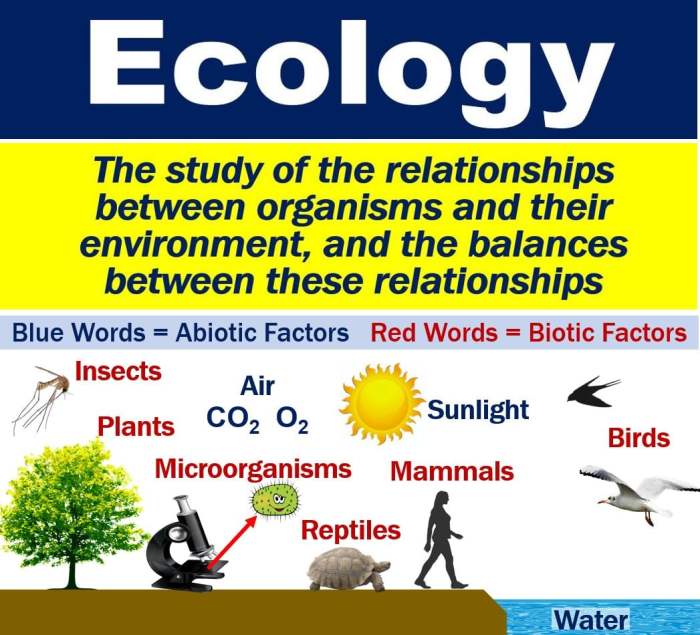Embarking on a journey to decipher the intricate tapestry of ecology, this comprehensive guide, “Ecology Vocabulary Interactions within the Environment Answer Key,” unravels the fundamental terms and concepts that underpin this captivating field. Delving into the heart of ecosystems, we explore the dynamic interactions that shape their delicate balance, ultimately illuminating the profound impact human activities have on our planet.
As we navigate the intricacies of ecology, we uncover the profound role it plays in unraveling the complexities of the natural world, empowering us to safeguard and nurture its delicate ecosystems for generations to come.
Vocabulary Related to Ecology
Ecology is the scientific study of the interactions between organisms and their environment. Ecologists use a variety of terms to describe these interactions, including:
- Ecosystem:A community of living organisms and their physical environment.
- Population:A group of organisms of the same species that live in the same area.
- Community:A group of different populations that live in the same area.
- Habitat:The place where an organism lives.
- Niche:The role that an organism plays in its ecosystem.
- Symbiosis:A close relationship between two or more organisms.
- Predation:The act of one organism eating another.
- Competition:The struggle between organisms for resources.
| Term | Definition |
|---|---|
| Autotroph | An organism that can make its own food from inorganic matter. |
| Heterotroph | An organism that cannot make its own food and must eat other organisms. |
| Producer | An organism that makes its own food from inorganic matter. |
| Consumer | An organism that eats other organisms. |
| Decomposer | An organism that breaks down dead organisms. |
Interactions within Ecosystems
The interactions between organisms within ecosystems are essential for maintaining ecosystem balance. These interactions include:
- Competition:The struggle between organisms for resources.
- Predation:The act of one organism eating another.
- Symbiosis:A close relationship between two or more organisms.
- Mutualism:A symbiotic relationship in which both organisms benefit.
- Commensalism:A symbiotic relationship in which one organism benefits and the other is neither harmed nor benefited.
- Parasitism:A symbiotic relationship in which one organism benefits and the other is harmed.
These interactions play a vital role in maintaining ecosystem balance. For example, competition helps to regulate population size, predation helps to control the populations of prey species, and symbiosis helps to provide organisms with the resources they need to survive.
The interactions between organisms within ecosystems are complex and dynamic. They are constantly changing in response to changes in the environment. However, these interactions are essential for maintaining ecosystem balance and ensuring the survival of all organisms.
Ecology and the Environment

Ecology can help us understand the impact of human activities on the environment. By studying the interactions between organisms and their environment, ecologists can identify the ways in which human activities are disrupting these interactions and causing environmental problems.
For example, ecologists have studied the impact of climate change on coral reefs. They have found that rising ocean temperatures are causing coral reefs to bleach and die. This is having a devastating impact on the marine ecosystem, as coral reefs provide food and shelter for a variety of marine organisms.
Ecologists can also help us to find solutions to environmental problems. For example, ecologists have developed a variety of techniques to restore degraded ecosystems. These techniques include planting trees, restoring wetlands, and creating wildlife corridors.
Ecology is a vital tool for understanding and protecting the environment. By studying the interactions between organisms and their environment, ecologists can help us to identify the ways in which human activities are disrupting these interactions and causing environmental problems.
Ecologists can also help us to find solutions to these problems and ensure the sustainability of our planet.
Questions and Answers: Ecology Vocabulary Interactions Within The Environment Answer Key
What is the significance of ecology in understanding environmental issues?
Ecology provides a framework for comprehending the intricate relationships between organisms and their surroundings, enabling us to assess the impact of human activities on ecosystems and devise strategies for sustainable development.
How can ecological knowledge contribute to solving environmental problems?
By understanding the ecological principles that govern ecosystems, we can develop targeted interventions and policies that mitigate environmental degradation, preserve biodiversity, and promote the resilience of natural systems.